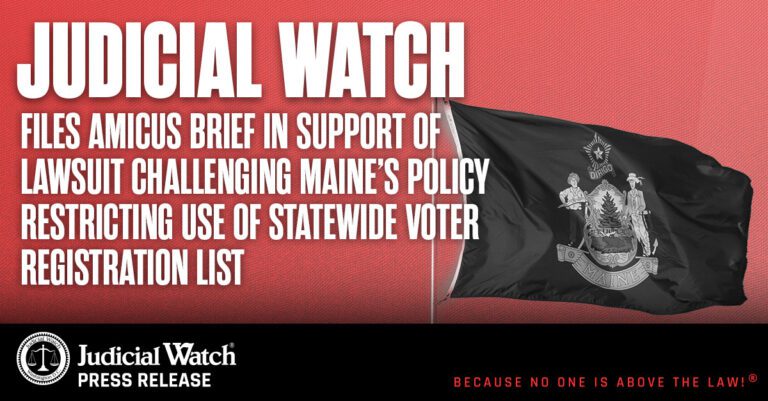
Judicial Watch Files Amicus Brief in Support of Lawsuit Challenging Maine’s Policy Restricting Use of Statewide Voter Registration List

(Washington, DC) – Judicial Watch announced today it filed an amicus curiae (friend of the court) brief, supporting the decision of the U.S. District Court for the District of Maine, which struck down Maine’s policy restricting the use and distribution of the state’s voter registration list (Public Interest Legal Foundation v. Shenna Bellows (No. 23-1361).
The lawsuit, citing the National Voter Registration Act (NVRA), is now in the U.S. Court of Appeals for the First Circuit. Judicial Watch points out:
In the last ten years, no organization public or private has obtained more statewide settlement agreements or consent decrees against chief state election officials for violations of the NVRA. As part of its list maintenance enforcement efforts, Judicial Watch also routinely requests public records of voter registration activities in various states under Section 8(i) of the NVRA, and has sued on its own behalf and on behalf of others to enforce it.
Judicial Watch argues:
The public disclosure provision of the NVRA embodies Congress’ intent that Americans’ right to vote “must not be sacrificed to administrative chicanery, oversights, or inefficiencies.” … The NVRA’s public disclosure provisions mandates that “State officials labor under a duty of accountability to the public in ensuring that voter lists include eligible voters and exclude ineligible ones in the most accurate manner possible.” … The NVRA provides an avenue for citizens to check that and to ensure that only eligible registrants remain on the rolls by providing the full voter registration list open to public inspection. “Without such transparency, public confidence in the essential workings of democracy will suffer.”
Judicial Watch reminds the Appeals Court that:
No court has adopted Appellant’s [State of Maine] argument here. Rather, all courts presented with this issue have found that the voter registration list is a record subject to disclosure under the NVRA. This Court should reject Appellant’s argument.
According to a national study conducted by Judicial Watch in 2020, Maine’s statewide registration rate was 101% of eligible voters.
“Federal law mandates voter roll transparency,” said Judicial Watch President Tom Fitton. “Given Maine’s refusal to release its voter roll information, it’s reasonable to think that cleaning up voter rolls is not a priority. Dirty voter rolls can mean dirty elections.”
Judicial Watch is a national leader in voting integrity and voting rights. As part of its work, Judicial Watch assembled a team of highly experienced voting rights attorneys who stopped discriminatory elections in Hawaii, and cleaned up voter rolls in California, Ohio, Indiana, and Kentucky, among other achievements.
Robert Popper, a Judicial Watch senior attorney, leads its election law program. Popper was previously in the Voting Section of the Civil Rights Division of the Justice Department, where he managed voting rights investigations, litigations, consent decrees, and settlements in dozens of states.
Judicial Watch recently settled a federal election integrity lawsuit on behalf of the Illinois Conservative Union against the state of Illinois, the Illinois State Board of Elections, and its director, which grants access to the current centralized statewide list of registered voters for the state for the past 15 elections.
In April 2023, Pennsylvania settled with Judicial Watch and admitted in court filings that it removed 178,258 ineligible registrations in response to communications from Judicial Watch. The settlement commits Pennsylvania and five of its counties to extensive public reporting of statistics regarding their ongoing voter roll clean-up efforts for the next five years.
In March 2023, Colorado agreed to settle a Judicial Watch NVRA lawsuit alleging that Colorado failed to remove ineligible voters from its rolls. The settlement agreement requires Colorado to provide Judicial Watch with the most recent voter roll data for each Colorado county each year for six years.
In February 2023, Los Angeles County confirmed removal of 1,207,613 ineligible voters from its rolls since last year, under the terms of a settlement agreement in a federal lawsuit Judicial Watch filed in 2017.
Judicial Watch settled a federal election integrity lawsuit against New York City after the city removed 441,083 ineligible names from the voter rolls and promised to take reasonable steps going forward to clean its voter registration lists.
Kentucky also removed hundreds of thousands of old registrations after it entered into a consent decree to end another Judicial Watch lawsuit.
In February 2022, Judicial Watch settled a voter roll clean-up lawsuit against North Carolina and two of its counties after North Carolina removed over 430,000 inactive registrations from its voter rolls.
In March 2022, a Maryland court ruled in favor of Judicial Watch’s challenge to the Democratic state legislature’s “extreme” congressional gerrymander.
###
















